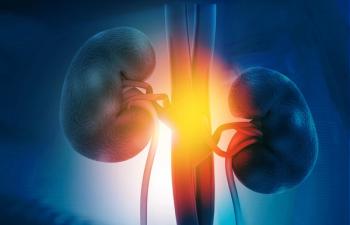
Pembrolizumab Plus Axitinib vs Standard Treatment For mRCC
Treatment with pembrolizumab plus axitinib improved response and survival compared with sunitinib in patients with advanced, or metastatic clear-cell renal cell carcinoma.
Combination treatment with pembrolizumab plus axitinib significantly improved response and survival compared with sunitinib in patients with advanced, or metastatic clear-cell renal cell carcinoma (RCC), according to the results of the KEYNOTE-426 study presented at the 2019 ASCO Genitourinary Cancers Symposium.
“Pembrolizumab plus axitinib should be a new standard therapy for first-line treatment of patients with metastatic renal cell carcinoma,” Thomas Powles, MD, professor of urology oncology at Barts Cancer Institute in London, England, said in a press conference ahead of the conference.
When given as single-agents, both pembrolizumab and axitinib have shown efficacy in treating patients with treatment-naive mRCC. A phase I b study of the combination showed very high response rates and an acceptable safety profile.
The
Patients assigned to the combination therapy had a 47% reduction in the risk for death compared with sunitinib (hazard ratio [HR], 0.53; 95% CI, 0.38–0.74; P < .0001). At 12 months, the overall survival was 89.9% for pembrolizumab plus axitinib compared with 78.3% for sunitinib. At 18 months the rates were 82.3% vs 72.1%.
According to Powles, the benefit of combination treatment was seen regardless of programmed death-ligand 1 (PD-L1) status.
Combination treatment was also associated with a 31% reduction in the risk for progression (HR, 0.69; 95% CI, 0.57–0.84; P = .0001). The median progression-free survival was 15.1 months for pembrolizumab plus axitinib compared with 11.1 months for sunitinib.
The overall response rate was 59.3% for combination treatment compared with 35.7% for sunitinib (P < .0001). Median duration of response for pembrolizumab plus axitinib was not reached compared with 15.2 months for sunitinib.
Serious treatment-related side effects occurred in 62.9% of patients assigned to the combination arm compared with 58.1% of patients assigned to sunitinib. These side effects led to discontinuation in 8.2% and 10.1% of the groups, respectively.
“We have a number of unanswered questions at this point, particularly the absence of biomarkers to predict response. PD-L1 levels, which have been markers for immunotherapy success in other cancers, remain unproven in renal cancer. It is possible that by combining pembrolizumab with axitinib, the predictive value of PD-L1 is being masked,” Powles said. “Overall, we have not previously seen a renal cancer study which has improved response, progression-free survival, and overall survival. This is therefore a major step forward in renal cancer.”
Commenting on the importance of these results, ASCO Expert Robert Dreicer, MD, MS, MACP, FASCO, said, “Metastatic kidney cancer has very low survival rates and there have been few significant advances in treating this advanced form of the disease. These findings may help provide an important new option for patients.”
Newsletter
Stay up to date on recent advances in the multidisciplinary approach to cancer.














































